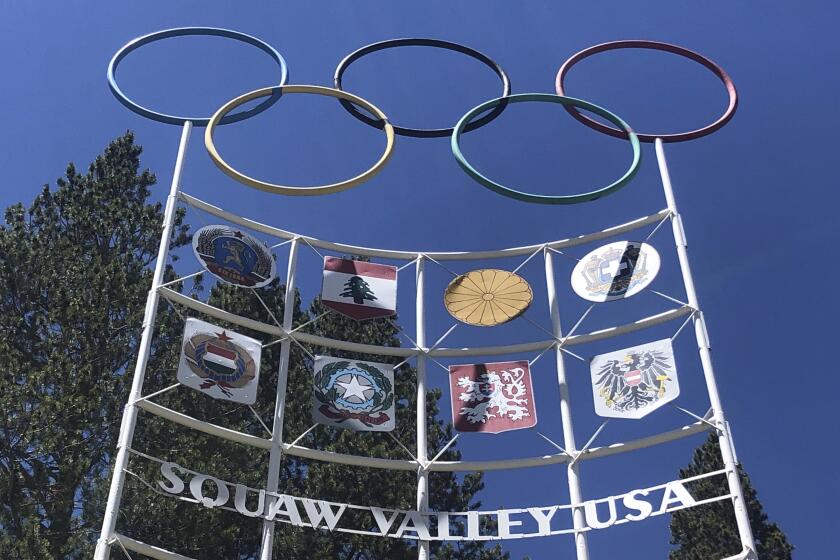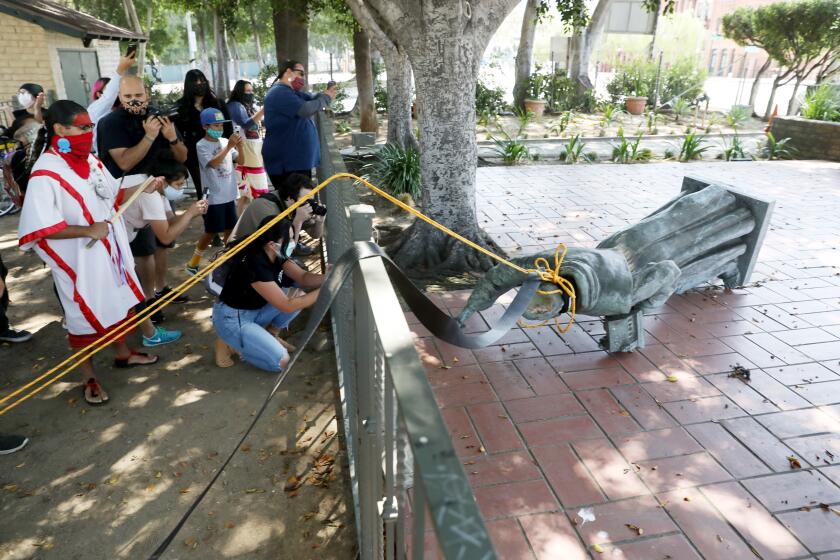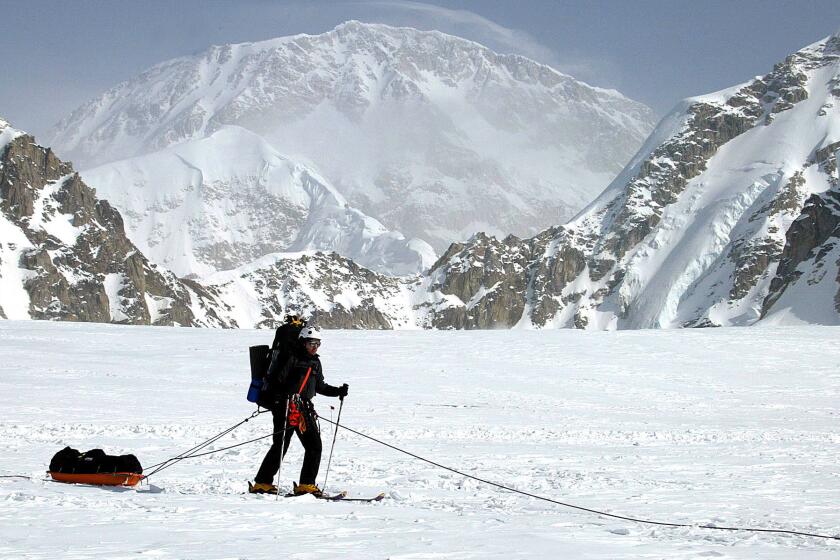California state park with ties to racist past will now be called by Indigenous name
- Share via
Skip Lowry learned the Indigenous dances of the Yurok people as a child by watching the elders gather in the summertime at a re-created village along the Humboldt County coast in Northern California.
The village, completed in 1990, was always a place of healing for Lowry, a Yurok descendant — but there was a lingering hurt there too. It’s in a state park that was named after a man accused of killing a Native American boy and committing other atrocities against Indigenous people in the 1800s.
“It’s always been a slap in my face and a punch in my stomach,” Lowry said.
But that changed Thursday when the California State Park and Recreation Commission took the unprecedented step of renaming the 625-acre park. The change, effective immediately, stripped the Patrick’s Point State Park moniker and restored its Indigenous Yurok name: Sue-meg.
The 5-0 vote marks the first time a California park was renamed as part of a statewide effort to identify and rectify derogatory names attached to parks and transportation systems, department officials said.
Proponents hope the move ushers in the restoration of other Indigenous place names in California and across the country. Various institutions — including schools, towns and ski resorts — have been grappling with such issues.
The Lake Tahoe-area ski resort Squaw Valley is adopting a new name after weighing criticisms that ‘squaw’ is a sexist slur against Indigenous women.
Sara Barth, a parks commissioner from Pleasanton, called the name change an “opportunity to right a historic wrong” and echoed the widely held sentiment among the Yurok people that it represents the restoration of a name inappropriately taken.
Though Yurok Tribal Chairman Joseph L. James said justice could not be served for the boy who died, “we can move in the right direction — a healing,” he told meeting attendees before the vote. “And a good healing today is taking direct action” to rename the park.
Looming over the park’s history is the dark legacy of Patrick Beegan, an Irish settler who in 1851 had a claim in the area and established a ranch, according to a presentation given by Victor Bjelajac, a state parks superintendent for the North Coast Redwoods District. During his stint on the land, Beegan was accused of killing a Native American boy and reportedly fled. Authorities sold the land.
The Yurok people have been in the area “since time immemorial,” Bjelajac said, noting that as early as 1928, state officials wanted to designate it as a place for the tribe. That same year, the construction of a traditional village was proposed — though it took decades to come to fruition. The state acquired the parkland in 1930 and named it Patrick’s Point in 1963.
A striking rock formation lies off the coast from state park lands near the site of a former Yurok village that served as an important trade and cultural hub where tribes would gather seasonally to fish. The rock’s name — and now the park’s — is Sue-meg (pronounced “Sue-mae”).
Though interpretations vary, Lowry said the name is believed to translate to “habitually done” or “always done.” The eponymous rock has always been there, he said, even when obscured by waves.
The new name is fitting for the Indigenous people who have survived oppression and violence while living on the land for thousands of years, Lowry said. Yurok people still perform ceremonies in the area.
California confronts its racist, colonial past as statues fall, mascots are renamed and a town debates changing its name that honors a Confederate general.
“I’m so overwhelmed,” Lowry said following the vote, tearing up with joy. “My kids aren’t going to have to deal with the pain that I dealt with.”
Lowry, 41, can trace his lineage on his mother’s side back 10 generations to a village along the Klamath River. He’s also an interpreter for the state park and gives tours of the re-created village, where he immersed himself in his ancestral culture growing up.
His son, K’nek’nek’, now 12, had a protective brush dance performed for him there when he was an infant. Instead of growing up “overshadowed” by Beegan’s name, Lowry said, his children will know a different story: how the park’s name was reclaimed — and how their family helped bring about that change.
For the last few years, the grass-roots group True North Organizing Network, which coordinates an intertribal council to identify names deemed offensive to Indigenous people, has facilitated conversations around the name change. (Lowry sits on True North’s board in a capacity unrelated to his work for the state park.)
The Yurok tribe, which participates in the council, brought a formal request this year to rename Patrick’s Point — the culmination of a long-held desire.
North America’s tallest peak is getting a new name as the Obama administration resolves a decades-long dispute between Alaska and Ohio.
Terry Supahan, executive director of True North and a member of the Karuk tribe, said he hopes the Yurok tribe’s success is a catalyst, with more name changes to come.
It’s not an improbable dream. Though the move is a first for California state parks, there has been a larger cultural shift.
In 2015, President Obama changed the name of the tallest mountain in North America from Mt. McKinley, in honor of the former president, to Denali, the native Alaskan name for the towering peak.
Last month, the historic Squaw Valley ski resort near Lake Tahoe became Palisades Tahoe after its owners determined the term “squaw” was offensive to Indigenous women.
“Trying to honor and celebrate Indigenous and Native names is a good thing for all of us,” Supahan said. “It’s a good step toward the pathway of healing and recognizing genocide and historic trauma that came before us.”
More to Read
Sign up for Essential California
The most important California stories and recommendations in your inbox every morning.
You may occasionally receive promotional content from the Los Angeles Times.

















